

Communication Studies at the University of Western Australia on Blip. Ushahidi. Citpart. Digital Divide: The Three Stages. 5 Online Tools For Activists, By Activists. Susannah Vila directs content and outreach at Movements.org, an organization dedicated to identifying, connecting and supporting activists using technology to organize for social change.
Connect with her on Twitter @szvila. Why are social networks powerful tools for causes and campaigns? Many times, people begin to engage in activism only after they’ve been attracted by the fun stuff in a campaign — connecting with old friends and sharing photos, for example. When they witness others participating, they’ll be more likely to join the cause. With socializing as the primary draw, it’s become easier for organizers to attract more and more unlikely activists through social media. But once a campaign reaches its critical mass, activists might think about moving to other platforms made with their needs — especially digital security — in mind. Image courtesy of iStockphoto, onurdongel. Is freedom of the press a prerequisite for democracy?
Adding It Up: Press Freedom, Democratic Health and Public Media Funding. This week Reporters Without Borders released its 2011–2012 Press Freedom Index, and much of the attention has focused on the fact that the United States has dropped 27 places to 47th in the world, thanks in large part to the journalist arrests at Occupy Wall Street events.
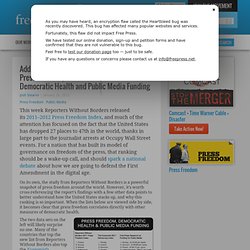
For a nation that has built its model of governance on freedom of the press, that ranking should be a wake-up call, and should spark a national debate about how we are going to defend the First Amendment in the digital age. On its own, the study from Reporters Without Borders is a powerful snapshot of press freedom around the world. However, it’s worth cross-referencing the report’s findings with a few other data points to better understand how the United States stacks up, and why this ranking is so important. When the lists below are viewed side by side, it becomes clear that press freedom correlates directly with other measures of democratic health.
Child Online Privacy Code trailer.mov. Data Protection Day. The Digital Divide at a glance. As the UN specialized agency for telecommunications, ITU collects the most comprehensive range of statistics on ICT penetration, accessibility and use.
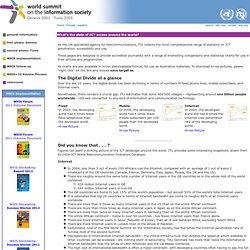
These pages are designed to provide accredited journalists with a range of interesting comparisons and statistical charts for use in their articles and programmes. All charts are also available in hi-res downloadable format, for use as illustrative materials. To download hi-res pictures, please "right click" on the link and choose save target as. World wakes up to digital divide. Some of the world's poorest nations are getting to grips with technology The digital divide, like many other economic or social problems, is a global issue.
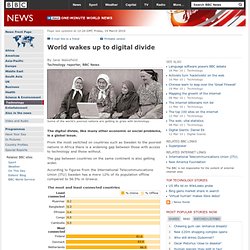
From the most switched on countries such as Sweden to the poorest nations in Africa there is a widening gap between those with access to technology and those without. The gap between countries on the same continent is also getting wider. According to figures from the International Telecommunications Union (ITU) Sweden has a mere 12% of its population offline compared to 56.5% in Greece. The scale of a country's digital divide reflects the condition of its economy, says ITU analyst Vanessa Gray. "In Sweden there is a population that is highly educated and a culture of trying new things whereas in Greece income levels and educational levels are lower," she said. Digital Divide - ICT Information Communications Technology - 50x15 Initiative. The Digital Divide, or the digital split, is a social issue referring to the differing amount of information between those who have access to the Internet (specially broadband access) and those who do not have access.
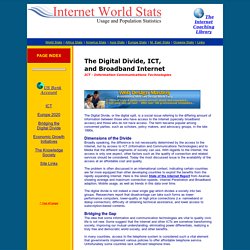
The term became popular among concerned parties, such as scholars, policy makers, and advocacy groups, in the late 1990s. Dimensions of the Divide Broadly speaking, the difference is not necessarily determined by the access to the Internet, but by access to ICT (Information and Communications Technologies) and to Media that the different segments of society can use. With regards to the Internet, the access is only one aspect, other factors such as the quality of connection and related services should be considered.
Today the most discussed issue is the availability of the access at an affordable cost and quality. The digital divide is not indeed a clear single gap which divides a society into two groups. 1. 2. 3. 4. Europa - Information Society. Ohmy News International. The Factory of the Common. Arab Spring, Occupy Wall Street, and Historical Frames: 2011, 1989, 1968. Activists and analysts increasingly join the Arab Spring with Occupy Wall Street.
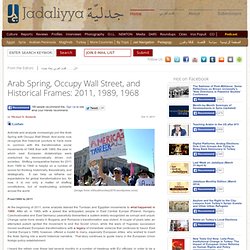
And some now recognize this historical juncture to have more in common with the transformative social movements of 1968 than with 1989, the year in which east European dictatorships were overturned by democratically driven civil societies. Shifting comparative frames for 2011 from 1989 to 1968 is helpful on a number of scores for thinking historically, theoretically, and strategically. It can help us reframe our expectations for global transformations too: for now, it is not only a matter of drafting constitutions, but of rearticulating solidarity across the world. From1989 to 2011 At the beginning of 2011, some analysts likened the Tunisian and Egyptian movements to what happened in 1989. There are important parallels between 1989 and 2011 to keep in mind. 2011 is not 1989 That universality already limits the parallels between 1989 and 2011. 2011 approaches 1968.
Robert Barrett, PhD: Occupy Wall Street Is Not the Arab Spring. This past weekend, the much-hyped Occupy Wall Street campaign went viral -- if only there was an easy cure.
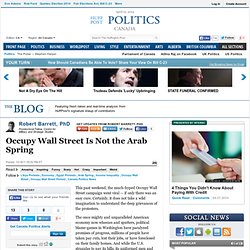
Certainly, it does not take a wild imagination to understand the deep grievances of the protesters. The once mighty and unparalleled American economy now wheezes and sputters, political blame-games in Washington have paralyzed promises of progress, millions of people have taken pay cuts, lost their jobs, or have foreclosed on their family homes. And while the U.S. struggles to pay its bills, its uniformed men and women soldier on in far-away sands and on multiple and questionable fronts -- all while the barons of Wall Street get richer on the backs of taxpayer bailouts. Not a pretty picture. Insofar as these are anywhere close to the grievances of the protesters, their loudly bellowed words are much more closely aligned with America's strong right-hook Tea Party than any socialist agenda. I have witnessed true economic disparity in Sub-Saharan Africa. Wall Street action part of global Arab Spring? Press Freedom Index 2011-2012. Americas United States and Chile affected by protests, Brazil crippled by insecurity.
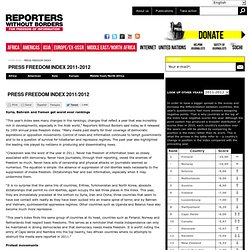
Cablegate One Year Later: How WikiLeaks Has Influenced Foreign Policy, Journalism, and the First Amendment. One year ago today, WikiLeaks started publishing a trove of over 250,000 leaked U.S.
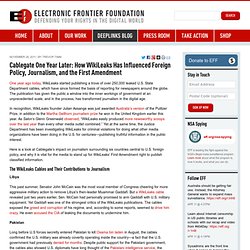
State Department cables, which have since formed the basis of reporting for newspapers around the globe. The publication has given the public a window into the inner workings of government at an unprecedented scale, and in the process, has transformed journalism in the digital age. In recognition, WikiLeaks founder Julian Assange was just awarded Australia’s version of the Pulitzer Prize, in addition to the Martha Gellhorn journalism prize he won in the United Kingdom earlier this year. As Salon’s Glenn Greenwald observed, “WikiLeaks easily produced more newsworthy scoops over the last year than every other media outlet combined.”
Yet at the same time, the Justice Department has been investigating WikiLeaks for criminal violations for doing what other media organizations have been doing in the U.S. for centuries—publishing truthful information in the public interest. Libya Pakistan Yemen Egypt Tunisia Iraq. WikiLeaks Archive — Cables Uncloak U.S. Diplomacy. Some of the cables, made available to The New York Times and several other news organizations, were written as recently as late February, revealing the Obama administration’s exchanges over crises and conflicts.
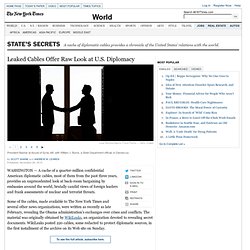
The material was originally obtained by , an organization devoted to revealing secret documents. WikiLeaks posted 220 cables, some redacted to protect diplomatic sources, in the first installment of the archive on its Web site on Sunday. The disclosure of the cables is sending shudders through the diplomatic establishment, and could strain relations with some countries, influencing international affairs in ways that are impossible to predict. Secretary of State and American ambassadors around the world have been contacting foreign officials in recent days to alert them to the expected disclosures. Breaking through information monopoly - Features. TUNIS, Tunisia - As history has shown repeatedly, access to information can play a decisive role in triggering social change.
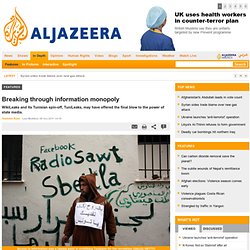
The publication of leaked diplomatic cables by the whistle-blowing organisation WikiLeaks has been controversial. But as a panel at the Third Arab Bloggers' Meeting affirmed this week, the monopoly of state media in most authoritian Arab regimes had been progressively undermined for several years as citizens sought alternative information from dissident bloggers and television. WikiLeaks, if anything, offered the final blow, and, in fact, found partners in the Arab world in the alternative media.
In North America and Europe, WikiLeaks formed partnerships with major news organisations. Estadisticas Mundiales del Internet - Exito Exportador - Poblacion.